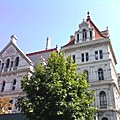- By -Staff
- News
 Print
Print  The state Department of Labor’s (DOL) failure to maintain records on building boilers and asbestos remediation projects needing inspection may jeopardize public health and safety, according to an audit released today by New York State Comptroller Thomas P. DiNapoli. The audit also found that DOL failed to collect $3.8 million from building owners who had boilers inspected, asbestos abatement contractors and employers who failed to comply with workplace safety rules.
The state Department of Labor’s (DOL) failure to maintain records on building boilers and asbestos remediation projects needing inspection may jeopardize public health and safety, according to an audit released today by New York State Comptroller Thomas P. DiNapoli. The audit also found that DOL failed to collect $3.8 million from building owners who had boilers inspected, asbestos abatement contractors and employers who failed to comply with workplace safety rules.“The Department of Labor is not collecting all the fees and payments it should because it lacks complete information on items and activities that must be inspected to ensure public safety, such as boilers in apartment buildings. By not having a complete record of boilers throughout the state, the public is at risk of faulty boilers that may go uninspected and the state is losing out on inspection-related revenues,” DiNapoli said. “In cases where DOL has the needed information, it often fails to collect associated fees. DOL clearly needs to do a better job to ultimately ensure the safety of New Yorkers and make sure taxpayers are getting a fair shake.”
DOL collects a wide range of fees and payments for various licenses, certifications and services rendered for the three years ended March 31, 2011, DOL collected $79.2 million in fees and penalties.
DiNapoli’s auditors reviewed the three fees with the highest reported revenue - boiler inspections, public work enforcement and asbestos abatement - which account for $70.7 million of the total fees collected by DOL during the audit period. Auditors found that DOL’s boiler inspection unit did not have a complete record of the boilers that exist throughout the state and thus does not know how many boiler inspections are required, costing the state potential revenue. This puts the public at risk if they reside in buildings that are not receiving the required inspections.
DOL’s asbestos control bureau oversees the abatement of toxic hazards associated with asbestos fiber, a known carcinogen, during the rehabilitation, reconstruction or demolition of buildings. DOL reduced the risks to the public associated with exposure to asbestos by establishing an inspection and enforcement program. Contractors involved with asbestos projects meeting the minimum size pay up to $4,000 for a project notification fee depending on the amount of asbestos in the project.
DiNapoli’s auditors found that while most contractors follow the self-notification process and pay the fee, DOL has no method for determining whether there are other contractors that should be paying the fee, or how much the fee should be. As a result, there is no way to know how much more DOL could be collecting in revenue each year, as well as diminished assurances of public safety.
Separately, state law requires contractors on public work projects to pay prevailing wage rates to all covered employees. More than 10,000 public work projects are engaged each year in New York. Each state agency or public benefit corporation that enters into a public work contract is required to remit one-tenth of one percent of the total contract cost to the Public Work Enforcement Fund.
DiNapoli’s auditors found only eight of the more than 500 state and local authorities that exist in New York, reported public work projects from April 1, 2008 through Feb. 7, 2011. These eight authorities remitted $8.5 million to DOL. Auditors contacted 16 large public authorities that had not remitted money to the fund and asked if they had public work projects during the audit period. Eleven of these reported a total of $535.6 million in projects covered by the fund, during the period April 1, 2008 through April 29, 2011, but had not contributed the required $535,576 to the fund.
Auditors found DOL does not have a process for determining which public authorities are required to remit this fee and for which contracts. As a result, DOL is not receiving all required fees.
DiNapoli recommended DOL:
- Assess late payment penalties on all late boiler inspection fee payments;
- Collect all boiler inspection revenues due;
- Stop waiving boiler inspection late penalties without adequate justification and document the reasons in all cases where penalties are waived;
- Work with the Department of State and code enforcement officials to identify, update and maintain a current inventory of all boilers needing inspection;
- Develop a method to identify and ensure fund payment by public authorities that have related public work contracts;
- Develop a method to identify and ensure asbestos project notification fee payment by contractors; and
- Review the asbestos fee structure to determine whether a more equitable structure could be created based on the size of a project to possibly increase revenue.
DOL generally agreed with the audit’s findings and has begun implementing them. The agency has also proposed legislation that would address penalty enforcement and the collection of fees.
v9i21



